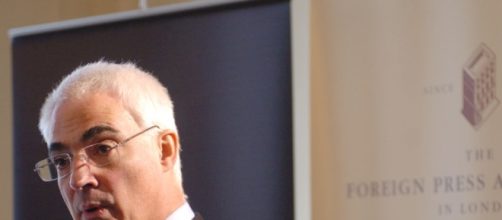Britain would not have voted for Brexit last year if the recession did not happen ten years ago, former chancellor Alistair Darling says.
Commenting on the ten year anniversary of the Northern Rock disaster, which saw droves of customers queuing up outside the bank's branches across the country to withdraw all their cash, he admitted that Labour lost control that day. The former Edinburgh MP said that the consequences of that event are still being felt today.
Mr. Darling said the 2007-08 Great Recession traumatised millions of people throughout the UK and that the political consequences of that occasion sparked a rise in Euroscepticism.
He said that the event shattered people's trust in authority and that an economic crisis later transformed into a political one.
There is a direct link between Brexit and the global financial crisis
The former chancellor said that austerity caused many people to feel like they were being punished for others' mistakes.
Mr. Darling said there is a direct link between Brexit and the global financial crisis. He said people would not have voted to leave the European Union if they did not feel so disillusioned and squeezed by the political and economic events that have happened since 2007. He said many voters were looking for someone to blame.
The former Labour MP commented on the ten year anniversary of the collapse of Northern Rock at an event organised in London by the Resolution Foundation.
The Conservative MP for Loughborough and Chairman of the Treasury Select Committee, Nicky Morgan, also attended the event.
She said that the financial crisis is still brought to her attention by voters on doorsteps in her constituency to this day. The Tory MP said that many people feel that if the government can find the money to bail out banks like Lloyds TSB, Northern Rock and Halifax, then they can spare some cash to fund their public services.
The Great Recession has created an "us and them" culture
She said the Great Recession has created an "us and them" culture.
Even though recent figures show that unemployment has dropped to its lowest level since 1975 and that the labour market remains strong, wage rises are failing to keep pace with the rate of inflation.
Mr. Darling said the consequences of austerity have been felt across the world. He said Donald Trump would not have been elected if it was not for the banking crisis, adding that austerity has been a monumental political failure. He attacked the amount of printed money caused by quantitative easing and historically low interest rates, which many consumers are not prepared for.
Low interest rates have caused customers to excessively borrow money
Ms Morgan, whose committee will be meeting today, said that low interest rates have caused customers to excessively borrow money. She said she intends to explore the impact lending is having on households. She is also pushing for more diversity on banks' executive boards.
The former chancellor defended the last Labour government's decision not to prosecute bankers, adding the regulatory reforms introduced since have tackled poor financial practices. He said the banks should not be allowed to become too big ever again.
Mr. Darling has recently revealed that his scariest moment of the Great Recession was a phone call he received from former Royal Bank of Scotland (RBS) chairman, Tom McKillop, who warned him that day in 2008 that his bank was about to run out of money in the afternoon.
He defended Labour's decision to bail out the banks, despite taxpayers still owning 71 per cent of RBS to this day. The former chancellor said if the government did not bail out the banks, the markets would have panicked.
Mr. Darling warned of complacency, adding it is difficult to predict when the next recession may happen. However, Sir John Gieve, former deputy governor of the Bank of England in between 2006-09, said banks possess more capital and are stringent to tougher regulations these days.
Mr. Darling resigned as an MP in the 2015 General Election. He served as Chancellor of the Exchequer in between 2007-10.

